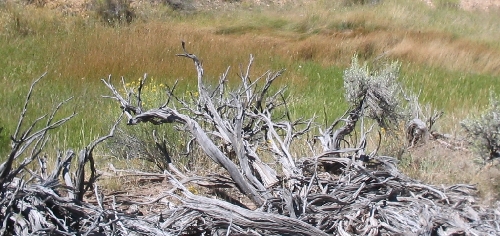Flanders Fields
By Lt. Col. John Mc Crae, M.D.
In Flanders fields the poppies blow
between the crosses, row on row,
that mark our place, and in the sky
the larks, still bravely singing, fly
scarce heard amid the guns below.
We are the Dead, short days ago
we lived, felt dawn, saw sunset glow,
loved and were loved, and now we lie
in Flanders Fields.
Take up the quarrel with the foe.
To you from falling hands we throw
the torch; be yours to hold it high.
if ye break faith with us who die
we shall not sleep, though poppies grow
in Flanders Fields.
Lieutenant Colonel John Mc Crae, MD (1872-1918) was a Canadian surgeon
who served in the first World War. Although he attended many wounds in
many battles, he never got used to seeing men suffer, scream and bleed from
their injuries. In the spring of 1915 following "the terrible battle in the Ypres salient"
Mc Crae expressed his anguish in this poem. Another officer told how he saw McCrae
write the poem as he eyed the grave of a young friend and former student-- he helped
bury the previous day. Mc Crae tossed the poem--which was later retrieved by a
colleague. He sent the poem to The Spectator in London--but they rejected it.
Punch Publishing later accepted it and issued it on December 8, 1915.
It is one of the most memorable war poems ever written.
(Let's think about outlawing war this Memorial Day--it can happen.
As JFK once said about peace-it may not happen in our time but let's
start somewhere. )- Doris Cadigan, May 26, 2003 from Axis of Logic

Silver wood Regina NM
By Lt. Col. John Mc Crae, M.D.
In Flanders fields the poppies blow
between the crosses, row on row,
that mark our place, and in the sky
the larks, still bravely singing, fly
scarce heard amid the guns below.
We are the Dead, short days ago
we lived, felt dawn, saw sunset glow,
loved and were loved, and now we lie
in Flanders Fields.
Take up the quarrel with the foe.
To you from falling hands we throw
the torch; be yours to hold it high.
if ye break faith with us who die
we shall not sleep, though poppies grow
in Flanders Fields.
Lieutenant Colonel John Mc Crae, MD (1872-1918) was a Canadian surgeon
who served in the first World War. Although he attended many wounds in
many battles, he never got used to seeing men suffer, scream and bleed from
their injuries. In the spring of 1915 following "the terrible battle in the Ypres salient"
Mc Crae expressed his anguish in this poem. Another officer told how he saw McCrae
write the poem as he eyed the grave of a young friend and former student-- he helped
bury the previous day. Mc Crae tossed the poem--which was later retrieved by a
colleague. He sent the poem to The Spectator in London--but they rejected it.
Punch Publishing later accepted it and issued it on December 8, 1915.
It is one of the most memorable war poems ever written.
(Let's think about outlawing war this Memorial Day--it can happen.
As JFK once said about peace-it may not happen in our time but let's
start somewhere. )- Doris Cadigan, May 26, 2003 from Axis of Logic
Silver wood Regina NM
